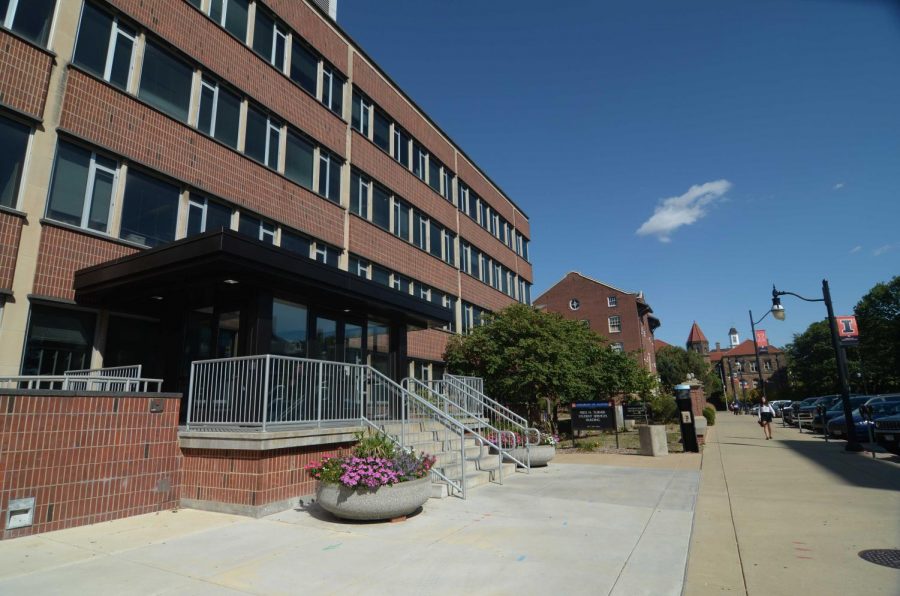Dean of Students works with students to combat drinking violations
The Counseling Center is located at the Turner Student Services Building, 610 E. John St., Champaign. The University offers a variety of resources to help students adjust to college and campus life.
Nov 2, 2017
With over 200 students caught for alcohol violations in the past year, the University is warning against harmful misconduct on campus and is stressing its goal for individual student improvement.
Pat Wade, spokesperson for the University of Illinois Police Department, said UIPD officers are not simply looking for students drinking underage.
“Our officers are not just walking down Green Street arresting people who appear to be drunk and underage,” Wade said. “If we tried to stop every person who was underage drinking, that’s all we would do.”
Wade said their officers are trying to target behavior. They would look at instances where a student is wandering the street oblivious to traffic or damaging property.
If a student is given a drinking violation, that student will either end up going through the legal system or being referred to the student discipline office within the Office of the Dean of Students.
Get The Daily Illini in your inbox!
“In the vast majority of incidents here at the University, we are going to go to the Dean of Students for student discipline,” Wade said.
The reason for this is that it keeps the situation out of the legal system and will not show up on any permanent record when students are applying for jobs, said Wade.
“As long as that student is not posing some kind of greater risk to our campus, we want to try to deal with it at the lowest level possible,” Wade said.
January Boten, Assistant Dean of Students, said when the written violation reaches her office, there are specific procedures that are done.
Boten said they initially send a letter requesting that the student come into their office to talk about the circumstances in which they received the ticket.
“My goal, as someone meeting with them, is to not have the same thing happen again. So we just talk about what motivated them,” Boten said.
There are two types of sanctions Boten explains are used: formal sanctions and educational sanctions.
“If this is the first time ever receiving a drinking ticket, then their sanction is a reprimand, which is just a warning that goes away after a year and is internal to our office,” Boten said.
This reprimand is really just a motivation to not continue this behavior, Boten said, but otherwise does not impact anything else.
For example, Boten said they could see students drinking because of stress relief, poor decision making or alcohol abuse. In these cases, their educational sanction corresponds, such as taking online courses, attending workshops or going to counseling.
“Probably the most frequent thing we do is have them do an online evaluation about their alcohol abuse and then write a reflection paper about it,” Boten said.
Boten stressed that each student is looked at on an individual basis, so there is no such thing as a “standard” way of going about a particular violation.
The Office of the Dean of Students strictly looks at violations of student conduct associated with the University, said Boten.
“Sometimes the students are dealing with the legal system and us,” she said. “But we are totally separate from the legal system.”
Boten said she is unaware whether Student Legal Services provides students representation in court, but the Office of the Dean of Students does not.
Michael Powers, sophomore in DGS, received a drinking ticket last year during the campus Unofficial St. Patrick’s Day celebration.
Powers described the situation that two students around the age of 18 showed up to their house, both of whom were being paid by the Champaign Police Department. After he and his friends gave these students a beer, a bus showed up and police officers surrounded the house. Everyone there received drinking tickets.
“The cops told us they weren’t going to tell the University,” Powers said. “But we all got emails like a month later saying we had to do a course and write a paper and send it.”
Though both the police department and the Office of the Dean of Students are working to improve students’ lives, students still run the risk of an alcohol violation negatively impacting their time at the University.
“In terms of the educational sanctions, we really try to listen to what is going on with the individual students,” Boten said.






